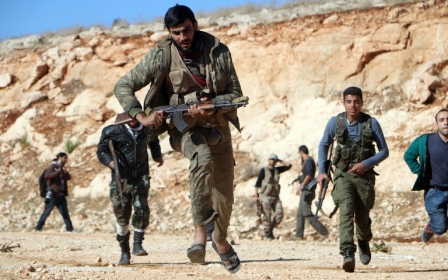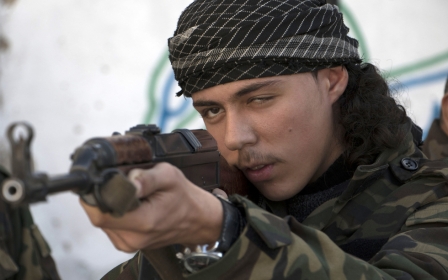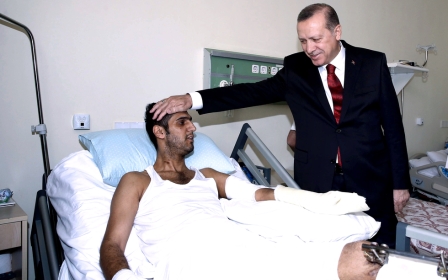Kurds celebrate capture of key IS stronghold in Syria

ERBIL, Iraq – Syrian Kurds on Friday marked the capture of Shadadi with celebratory gunfire in the streets. It was the last town the Islamic state (IS) group controlled in Syria's northeastern Hasakah province.
The capture cut off a key supply route for IS between their Iraqi and Syrian "capitals".
The Kurdish-led Syrian Democratic Forces (SDF), backed by US air strikes, took control of Shadadi in a three-day operation called Wrath of Khabur. The operation will help to further isolate IS’s headquarters in Raqqa.
“Massive congratulations on this great achievement by our heroes,” Colonel Talal Silo, a spokesperson for the SDF, said about the capture of Shadadi.
“This victory is dedicated to our martyrs and wounded fighters, who sacrificed their blood so we can celebrate victory, liberation, security and safety.”
Drawing borders
“Cizere [Hasakah] is now cleared from Daesh [IS],” said Abdulselam Mohamed, a teacher and Kurdish activist from the province of Hasakah. “The map has been drawn.”
Kurds hope that the province of Hasakah will be safer now that IS has retreated from most of the province. The victory will also help the Kurds draw the final borders of the Kurdish federal region they want to establish in northern Syria.
“This is another victory of the SDF against the worst enemy of the Kurdish people. All the people, not only Kurds, are happy,” said Can Mirzo, a Kurdish activist from the town of Amude.
“In this way, the border of the Kurdish region has been drawn, and it’s the last step for operations on the southern front line.”
The town was used by IS to train foreign fighters and organise bomb attacks on Kurdish-held areas that led to dozens of Kurdish and Christian civilian casualties in the towns of Qamishli and Tel Tamr last year.
“As it is known, Shadadi is very strategic to IS terrorists. All the offensives against al-Jazira [Hasakah province] take place from Shadadi and they targeted all the components living there,” the SDF said in a statement.
“It was important for the organisation. From here it planned its attacks in al-Hawl and Hasakah, and it was an official military centre for IS,” said Renas Shammo, a member of the SDF forces in Hasakah city.
“This [capturing Shadadi] will make it more difficult for them [IS] to plan operations in Iraq and Syria, and now they have no road left to Iraq,” he said.
YPG’s revenge
The operation launched on Tuesday was named after the Khabur region, where the IS group kidnapped dozens of Christians in villages close to the Khabur river in February last year, and took them to town of Shadadi.
“It took us three days to liberate it. It’s a strategic route for IS. They used it as the main road between Mosul and Raqqa,” said Salah Jamil, a member of the Kurdish People’s Protection Units (YPG), in an interview with Middle East Eye.
“The Yazidi girls were sold at the Shadadi market, and today we took revenge for them.”
The town was notorious in Syria for its use as a slave market to sell Yazidi girls as sex slaves captured in the region of Sinjar in August 2014. The New York Times also reported that a Saudi fighter raped a 12-year old Yazidi girl in Shadadi.
“One of the most famous [IS] princes who raped and killed most of the Yazidis is from Shadadi,” said Eidou Baba Sheikh, former advisor to Yazidi affairs President Jalal Talabani.
“The Yazidis are happy when they [SDF] liberated the town,” he said. “IS is the enemy of all the people, not just the Yazidis.”
US alliances
The operation is also important for the Kurds, after Turkey recently questioned the Western alliance with the YPG against IS, and after Ankara accused the YPG of a suicide attack on Wednesday that killed 28 soldiers, and the killing of civilians in Syria.
Ankara appears to see no difference between YPG and the Kurdistan Workers Party (PKK), which fights the Turkish army.
US President Barack Obama’s envoy for the US-led anti-IS coalition, Brett McGurk, visited Kobane in late January - reportedly to discuss future operations in Raqqa and the province of Hasakah - angering Turkey.
“The operation started, so everyone knows that the only ones fighting extremist groups are the SDF and the YPG,” said YPG member Salah Jamil.
“The relationship between the United States and us will not break. The Kurds are the most powerful force on the ground, and the war in Syria will continue."
Analysts say it’s unlikely the United States will break its ties with the YPG, despite Turkish pressure.
“It's not like there's much of a choice. From the US perspective, it's important to prevent a full turn towards Moscow,” said Aymenn Jawad al-Tamimi, a researcher with the Middle East Forum. “I think the US will probably maintain a YPG-PKK distinction.”
The operation achieved strategic aims of the US-led coalition against IS by destroying one of its last strongholds in Hasakah.
“Shadadi is an important logistics hub, and part of what we call the ‘line of communication’ between Raqqa and Mosul - a waypoint where they can move people and supplies between Syria and Iraq,” coalition spokesman Col. Christopher Garver told Middle East Eye.
“We are continuing to try to limit easy travel between the two - but there are many small goat trails and areas of open desert that make it extremely difficult to completely block travel,” he added.
Researcher al-Tamimi said: “This make it more difficult for IS to move between the borders of Iraq and Syria.
“It was also a key hub point in the war against the rebels in eastern Syria [in 2014]. Rebels tried initially to take IS's southern Hasakah strongholds in early 2014,” he added.
The operation again shows the importance of Kurdish fighters for the US-led coalition against IS.
By capturing Shadadi, the Kurds also captured one of the last large oil and gas fields in the province of Hasakah.
“It is also very important economically, it has a lot of oil fields which IS benefits from to improve its organisation’s finances,” said Massoud Mohammed, a local Kurdish activist and journalist.
Now the only remaining stronghold near the Kurds is Raqqa, the de-facto capital of IS's caliphate.
“By liberating Shadadi, the SDF will now focus on Raqqa, the capital of the IS,” he said.
New MEE newsletter: Jerusalem Dispatch
Sign up to get the latest insights and analysis on Israel-Palestine, alongside Turkey Unpacked and other MEE newsletters
Middle East Eye delivers independent and unrivalled coverage and analysis of the Middle East, North Africa and beyond. To learn more about republishing this content and the associated fees, please fill out this form. More about MEE can be found here.




